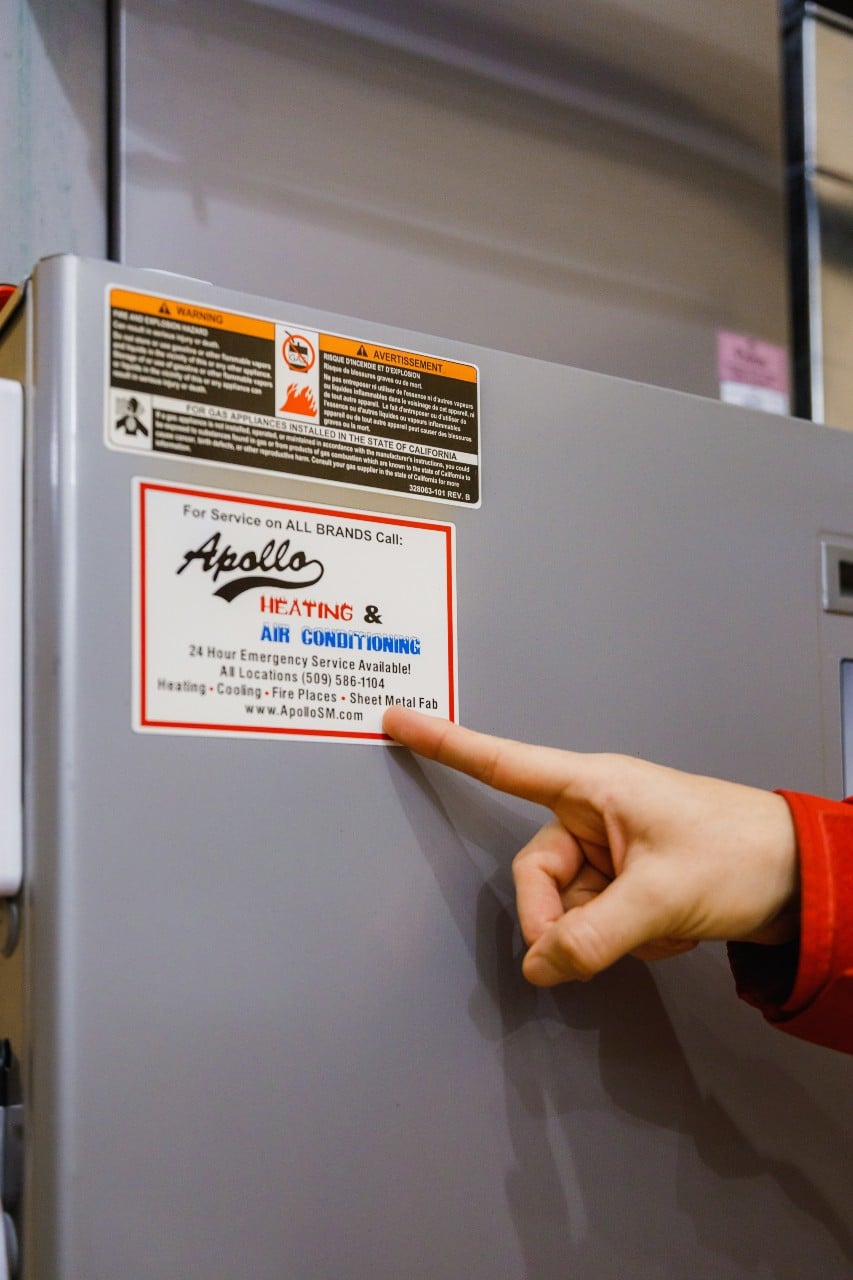Your heating and cooling system is one of the most critical elements of your home’s function and comfort. Minor unit inefficiencies can be inconvenient, but major breakdowns can be catastrophic for your family’s well-being during the hot summer months or the depths of a cold winter. When your system is on the fritz, trying to repair it yourself can be tempting.
In recent decades, do-it-yourself (DIY) projects have increased in popularity. The rise of the internet and accessibility to how-to videos, tools, and informative articles have made many DIY projects more accessible for even the least handy among us. However, there are certain limitations to DIY projects that you should consider, and a DIY heating system repair might be one of them! Read on for more information to consider when you are thinking of trying out a DIY heater repair!
Is a DIY Heater Repair Worth It? 
A heating and cooling system is one of the most complicated machines in any home. You have a furnace and air conditioning unit, fans, blowers, motors, and yards of ductwork that must work separately to help your home reach your desired temperature. Heater repairs are tricky because there could be several problems with your system simultaneously, and it is frequently challenging to diagnose the source. Unless you have previously worked in heating and cooling, we strongly suggest you consider the potential dangers of a DIY heater repair. Most of the time, your pocketbook, personal safety, and the integrity of your unit will thank you for calling a professional before attempting a repair yourself!
Potential Dangers of a DIY Heating System Repair
Before attempting your furnace repair, read these potential risks of DIY fixes! Here are the top six dangers of an at-home repair:
Long DIY Repair Times
If your HVAC breaks down, you want to get it up and running quickly. Heating and cooling professionals have years of experience diagnosing problems and will be able to spot your unit’s issue much faster than an unseasoned eye. They will advise you on the optimal solution for your situation, as well as other potential options you may have. Finding this knowledge online or through reading is much more challenging and wastes precious time during which your home could be more comfortable!
Voiding the HVAC Unit Warranty
Is your furnace system still under warranty? Then you should check the conditions of that document! Often, there is a clause in an HVAC warranty that states the warranty is only valid if the system is repaired or maintained by a heating and cooling professional. Attempting a DIY heater repair could put you at risk of calling in your warranty in the future.
Possible Safety Hazards to Health & Home
HVAC units are complex and have many interdependent and dangerous components. When delving into the inner workings of your system, there is a significant risk to your physical well-being. You could touch the wrong electrical components, leading to an electric shock that can damage your nervous system or even be fatal electrocution. You could mishandle the natural gas in your system leading to an explosion or fire in your home, or be burned by a heating element or the combustion chamber. If you have a ventilation problem, you risk inhaling carbon monoxide or gas fumes, which can lead to poisoning and potentially death. A DIY repair can put the handyman and the rest of the household members at risk.
Further Damage to Your Unit

Without the proper skills, technical knowledge, training, and experience, attempting a DIY repair could harm your system more than good. Even if you can get your system going again, it could be operating at a decreased efficiency, leading to problems with airflow, potential dangers, further damage, or increased electricity bills.
Lack of Adequate Tools, Parts, and Knowledge
HVAC unit repairs take a specialized skill set and tool set. Even if you can take apart some components with a screwdriver or wrench, the inner workings of the machinery need specific tools and unique replacement parts. A professional provides this equipment and knows how to use it effectively. Purchasing or learning how to use this equipment can be even more costly than hiring a repair professional.
Increased Avoidable & Unnecessary Expenses
All of these potential dangers can lead to an increase in the expense of repairing your HVAC system. Purchasing tools, voiding your warranty for future use, or having a medical emergency due to a failed DIY project can also be expensive. Even though you may think hiring a professional is expensive initially, it can be much more costly for them to come in and clean up your mistakes, especially if you irreparably damage your unit
Remove the Risk Starting a Fire
Tampering with your heating and cooling system can increase the risk of your unit starting a fire. Your heater burns propane or natural gas, which are highly combustible. Any disturbance to these gasses or their transportation can start a fire quickly. If you start a DIY heating system repair, you could unknowingly damage the gas supply line, safety valves, burner, or ignition. Disrupting the functionality of any of these components could cause gas to leak and a flame to erupt. Another consideration is a threat to the wiring. If you damage, cut, or reroute any wiring while performing a DIY heater repair, you could be in danger of starting a fire and falling victim to severe injuries.
 Manageable DIY Heater Repairs
Manageable DIY Heater Repairs
If you are a true DIY-er, you can still help your furnace system run better. Well, there are several things you can do at home without professional experience
Vacuum And Dust Your Unit Regularly
If your furnace isn’t functioning as it should or has stopped working, it may not be caused by as big of a problem as you think. The inside of your unit could just be a little dusty, and the dust build-up could have blocked up a part of the unit. You can try to avoid a heating system repair by simply cleaning the inside of your unit. First, turn off the power to your furnace, remove the combustion chamber door, and then the burner cover. Shut off the gas, then begin vacuuming the furnace burners and base. Every bit of dust can be vacuumed, but while you do so, inspect for signs of soot – a problem that indicates poor combustion. You can even vacuum the blower compartment and then remove it to vacuum and brush its blades.
Change Your Air Filters
One of the most common issues in any furnace is a clogged filter. Ideally, the filters on your unit should be replaced every ninety days to keep your system running at peak efficiency. Often, many homeowners either forget it’s time to change their filters and carry on with their busy lives until they notice significant changes in air quality or the furnace shuts down. You can find a middle-of-the-row fiberglass furnace filter for one dollar per filter. However, you can also install more expensive, high-efficiency filters for cleaner air, although they can reduce airflow and strain your system.
Clean Your Outdoor Unit
Cleaning your outside AC unit and installing insulation can also increase functionality. Sitting outside all day year-round can take its toll on any machinery. It collects dirt and debris, which can clog the machine or cause it to overheat. As your unit struggles, it becomes less efficient. You should vacuum and hose down your unit at least once a year to keep it at its maximum efficiency!
Inspect Your Burner Flames
A burner flame is the core of your heating system. A burner is where the air is mixed with natural gas, and the flame it produces is clean-burning, high-temperature, and can be adjusted to heat your entire home. You can inspect the status of your burner flames by opening the combustion chamber door and the burner cover. Inside you will find the burner flame. Ensure the power is on, then turn up your thermostat to activate the flames. A normal burner flame burns brightly, evenly, and blue. If you see your flame turning different colors, such as yellow, this can indicate a dirty burner. If you’re seeing yellow flames, it is time to call in a professional!
When To Call a Professional For Your Heater Repair
If you have an HVAC issue beyond these problems, it is ultimately best to call in a professional. Hiring a pro can not only have your system up and running faster than a DIY heater repair, but it can help take some of the stress and worry off your shoulders. In the long run, it can also prevent problems and save money!
How Apollo Heating and Air Conditioning Can Help
Are you experiencing HVAC problems in the Tri-Cities, Washington area? Apollo Heating and Air Conditioning are here to help! We have years of experience diagnosing furnace issues, maintaining and replacing units, and making complex repairs. Our services are cost-effective, timely, and personalized. Visit our website for more information on our services or to fill out our HVAC maintenance request form. Our team will respond promptly to help you get on your way to a more comfortable home!



